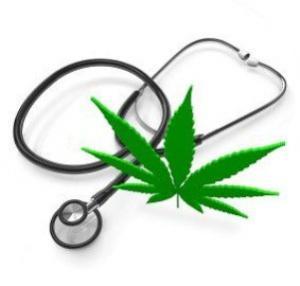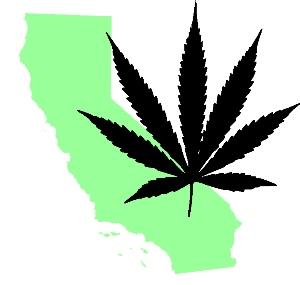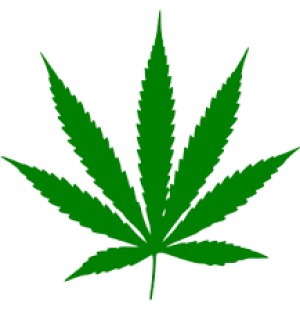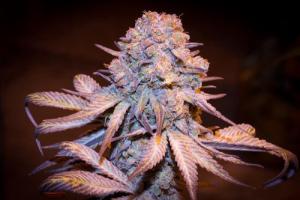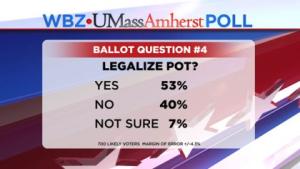A last ditch effort is underway to stop the DEA from acting precipitously to ban an herb used to help wean people from opioids.
No medical marijuana for Missouri this year, polling looks good for the Florida initiative and tense for competing Arkansas initiatives, Colorado moves toward adding PTSD as a qualifying condition, and more.
A Texas border town cop gets nailed for helping a cartel, an Indiana cop prepares to head to federal prison for peddling dope in uniform, and more.
What's behind the unrest in Charlotte? Donald Trump has a unique answer.
If not for prohibition, the death of Keith Scott and the civic unrest in Charlotte might never haver happened.
New polls show legalization initiatives leading in California and Nevada, Michigan will soon see medical marijuana dispensaries, Missouri won't get to vote on medical marijuana this year, Attorney General Lynch rejects the gateway theory, and more.
The DEA issues a warning on a powerful emerging opioid, Michigan marijuana legalizers turn their eyes to 2018, Malaysia sentences a man to death for pot dealing, and more.
Polls show thing looking good for legalization efforts in California and Maine, tight for medical marijuana in Arkansas, marijuana possession arrests hit a 20-year-low, and more.
NORML updates its congressional scorecard, Bay State legalizers cry foul over a misleading voter guide, the number of babies suffering from opioid withdrawals has jumped dramatically, Oregon top cops want to defelonize simple drug possession, and more.
The polls are looking good in Florida and Massachusetts, California's governor signs a mandatory prescription monitoring bill, Iran executes more drug offenders, and more.
This article was produced in collaboration with AlterNet and first appeared here.
In a last ditch bid to stop the DEA from criminalizing an herb widely hailed for its ability to treat pain, depression, and anxiety, and help people wean themselves from more dangerous opioid pain relievers, a bipartisan group of lawmakers sent a letter to the agency Monday asking it to reconsider its decision to place kratom on Schedule I of the Controlled Substances Act.
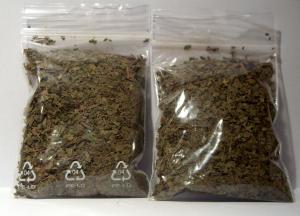
Kratom is headed for Schedule I (Creative Commons/Wikipedia)
is a southeast Asian herb made from the leaves of
Mitragyna speciose, a tree related to the coffee plant. In small doses, it has a mild stimulant effect, but in larger doses, it acts like a mild
opioid. To be precise, the DEA has moved to criminalize not the herb itself, but two alkaloids,
mitragynine and
7-hydroxmitragynine, which activate
opioid receptors in the brain.
Last month, the DEA exercised its emergency scheduling powers in announcing that it was moving kratom to Schedule I, effective at the end of this week. The drug agency said kratom poses "an imminent hazard to public safety," citing only press reports of some 15 deaths linked to kratom use. But in at least 14 of those cases, the victims were also using other drugs or had pre-existing life-threatening conditions. (Meanwhile, some 25,000 people died of prescription drug overdoses last year.)
Kratom users, who could number in the millions, immediately raised the alarm, organizing campaigns to undo the decision and lobbying Congress for help. That's what sparked Monday's letter from 51 lawmakers, including 22 Republicans.
"This significant regulatory action was done without any opportunity for public comment from researchers, consumers, and other stakeholders," reads the letter, drafted by Reps. Mark Pocan (D-WI) and Matt Salmon (R-AZ). "This hasty decision could have serious effects on consumer access and choice of an internationally recognized herbal supplement."
Given the ongoing high level of heroin and prescription opioid use and the associated overdose deaths, he DEA was hypocritical in mounting a campaign against kratom, the lawmakers said.
"The DEA's decision to place kratom as a Schedule I substance will put a halt on federally funded research and innovation surrounding the treatment of individuals suffering from opioid and other addictions -- a significant public health threat," they wrote.
The lawmakers called on DEA Administrator Chuck Rosenberg to delay the emergency scheduling and instead "engage consumers, researchers, and other stakeholders, in keeping with well-established protocol for such matters."
Since first emerging in the US a few years ago, kratom has been unregulated at the federal level, although the Food & Drug Administration began seizing shipments of it in 2014. At the state level, a half dozen states have entertained moves to ban it, but such efforts failed in all except Alabama. In other states, kratom advocates have managed to turn bans into regulation, with age restrictions and similar limits.
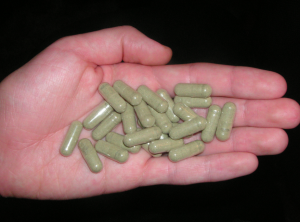
Kratom capsules (Creative Commons/Wikipedia)
"I didn't really want to have anything to do with a plant, but I decided to try it, and it worked day and night," she said Tuesday. "Within two weeks, I went from home bound to starting this organization."
With the kratom ban looming, her members are facing "our darkest hour," Ash said. "Our average member is a middle-aged woman, about 40% of whom have experienced addition, and tens of thousands of them are using it as an alternative to pharmaceutical medications because they believe it is safer and more natural. Now, people are saying they are going to lose their quality of life, that they will be re-disabled. People are terrified. What we need is regulation, not prohibition."
"Despite the moral, political, and scientific consensus that drug use and addiction are best treated as public health issues, the DEA wants to subject people with kratom to prison sentences," said Jag Davies, director of communications strategy for the Drug Policy Alliance (DPA), which is also fighting the ban. "The DEA's move would also effectively halt promising scientific investigations into the plant's uses and medicinal benefits, including helping many people struggling with opioid addiction."
The scientific studies are promising indeed. Researchers at Columbia University just published a study on kratom alkaloids and found that they activate opioid receptors in a way that doesn't trigger respiratory depression, the lethal side effect of most opioids. Such research could lead to the "holy grail" of narcotic analgesics, a painkiller that doesn't kill users and doesn't get them addicted.
"Our research shows that mitragynine and its analogs activate the opioid receptors in a unique way compared to morphine or oxycodone," said Dr. Andrew Kruegel, one of the Columbia researchers. "They activate a certain protein pathway while avoiding other pathways, and that gives you a better safety profile, mostly for respiratory depression. The scientific data is consistent with an improved safety profile from the alkaloids and suggestive of the same with the raw plant," he explained.
"This new prohibition will really restrict our ability to purse new opioid painkillers based on alkaloids and new safer drugs for pain," Kruegel said.
And then some, DPA's Davies added.
"Placing kratom in Schedule I would place regulatory and funding barriers in front of research, drive users into the black market, and leave them facing lengthy prison terms," he said. "It's troubling that the DEA is moving hastily to criminalize kratom at the same time Congress and the president have been made sentencing reform a priority this year and when communities are grappling with unprecedented rates of heroin and opioid overdoses, the DEA is threatening to punish people for using it instead of potent pharmaceutical preparations. Kratom has a role to play in mitigating the opioid crisis."
But not if the DEA refuses to budge from its ban plan. If the DEA cannot be moved, kratom is illegal as of this coming Friday.
back to top
No medical marijuana for Missouri this year, polling looks good for the Florida initiative and tense for competing Arkansas initiatives, Colorado moves toward adding PTSD as a qualifying condition, and more.
ArkansasLast Thursday, the state's highest court threw out a challenge to a medical marijuana initiative. The state Supreme Court has rejected a bid to throw the Arkansas Medical Cannabis Act (Question 7) off the November ballot. Foes had challenged the initiative's ballot language, but the high court said they had not proven it was insufficient. Two court challenges remain, one against Question 7 and one against the Arkansas Medical Marijuana Amendment (Question 6), both of which have qualified for the ballot.
On Sunday, Aa new poll showed a tough fight ahead for medical marijuana initiatives shows the Arkansas Medical Marijuana Amendment (Issue 6) with 36% in support, 53% opposed, and 11% undecided. "Arkansas voters do appear to distinguish between the two medical marijuana proposals, according to our survey," said pollster Roby. A Florida Chamber of Commerce poll has 73% of voters favoring the Amendment 2
Missouri
Last Wednesday, the medical marijuana initiative lost its bid to make the ballot about 2,000 signatures short of qualifying.
Missouri Medical Marijuana Initiative Will Not Make November Ballot. A Cole County circuit court judge has ruled against overturning petition signatures ruled invalid by local officials. New Approach Missouri came out just shy of valid signatures after local election officials denied about 10,700 signatures, leaving their initiative about 2,000 signatures short of qualifying.
[For extensive information about the medical marijuana debate, presented in a neutral format, visit MedicalMarijuana.ProCon.org.]
back to top
A Texas border town cop gets nailed for helping a cartel, an Indiana cop prepares to head to federal prison for peddling dope in uniform, and more. Let's get to it:
In Lawton, Oklahoma, a Lawton Correctional Facility guard was arrested last Wednesday for smuggling methamphetamine into the prison. Darnell Buckley apparently ratted himself out, showing Lawton police where he had hidden 204 grams of speed. He also admitted that he was being paid money to smuggle the drugs in. He is charged with trafficking illegal drugs.In Rio Grande City, Texas, a Rio Grande City police detective was arrested last Thursday for allegedly helping a drug cartel smuggle hundreds of pounds of marijuana into the US over a period of years by staging fake drug busts. Detective Ramon De La Cruz allegedly conspired with the Beltran Cartel to stage drug seizures and provide confidential police information to the gang. De La Cruz would allegedly set up busts where only some of the stash was seized, letting the rest get away.
In Brewton, Alabama, a Holman Correctional Facility guard was arrested Sunday for trying to smuggle illegal contraband into the prison. DeJuan Rudolph, 25, got caught with drugs, cell phones, and other contraband as he came to work. He is charged with trafficking cocaine, possession of a controlled substance, unlawful possession of marijuana, attempting to commit a controlled substance crime, and use of a position for personal gain.
In Indianapolis, a former Anderson police officer was sentenced Monday to eight months in federal prison for selling drugs while on duty and in uniform. Donald Jordan had been charged with one count each of possession with intent to distribute Xanax and hydrocodone and pleaded guilty. He went down last December following a year-long investigation after he sold drugs to a snitch and an undercover FBI agent.
back to top
This article was produced in collaboration with AlterNet and first appeared here.

Donald Trumps blames unrest in Charlotte on "drugs." (Gage Whitmore/Wikipedia)
"If you're not aware, drugs are a very, very big factor in what you're watching on television," the GOP contender claimed. He offered no evidence to support his claim.
Charlotte is only the latest American city to see outbreaks of street violence amid protests over the police killings of black men. In this case, it was the gunning down of Keith Scott Tuesday by an undercover Charlotte police officer. Scott's family maintains he was unarmed and holding only a book, while police say he was armed and they recovered a weapon at the scene. Police have so far refused to release body-cam video of the killing.
Casually blaming "drugs" for the community anger over the Scott killing is in line with Trump's effort to portray himself as a "law and order" candidate who will protect the black community. But that's a tough sell in minority areas where relations with police are, to put it mildly, fraught.
Trump is trailing Hillary Clinton by roughly 80 percentage points among African-American voters, and this is just the latest off-kilter attempt to woo them. Telling them they live in blighted communities hasn't worked, telling them they're living in the worst time ever for black Americans hasn't worked, relying on the likes of Don King hasn't worked. Blaming the unrest in Charlotte on "drugs" is unlikely to turn the tide, either.
But Trump is trying to make that "law and order" appeal.
"There is no compassion in tolerating lawless conduct. Crime and violence is an attack on the poor, and will never be accepted in a Trump Administration," he said at the beginning of remarks to the Shale Insight Convention. "Our job is not to make life more comfortable for the violent disrupter, but to make life more comfortable for the African-American parent trying to raise their kids in peace, to walk their children to school and to get their children a great education. We have to cherish and protect those people."
But then he ad-libbed his "drugs" remark, once again stereotyping the black community and contributing to the suspicion that his efforts to reach out to African-Americans are really aimed not at winning black votes but at convincing moderate Republicans and independents that he's not a racist.
And he followed up with a shoutout to law enforcement. He praised police for risking their lives, although he did acknowledge that they could make mistakes.
"Police are entrusted with immense responsibility, and we must do everything we can to ensure they are properly trained, that they respect all members of the public, and that any wrongdoing is always vigorously addressed," Trump said. "But our men and women in blue also need our support, our thanks, and our gratitude. They are the line separating civilization from total chaos."
And drugs.
(This article was prepared by StoptheDrugWar.org's lobbying arm, the Drug Reform Coordination Network, which also pays the cost of maintaining this web site. DRCNet Foundation takes no positions on candidates for public office, in compliance with section 501(c)(3) of the Internal Revenue Code, and does not pay for reporting that could be interpreted or misinterpreted as doing so.)
back to top
The chain of events that led to the death of Keith Lamont Scott at the hands of Charlotte Metropolitan Police Department (CMPD) officers and days of civic unrest in North Carolina's largest city began with a joint, Charlotte police said Saturday.
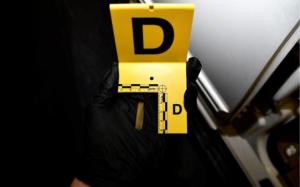
the fateful, fatal joint (CMPD)
That makes Scott
the 38th person to die in domestic drug law enforcement operations so far this year.
In an official statement posted on the CMPD's Facebook page and during a press conference last Saturday afternoon announcing that the department was releasing some police body- and dash-cam videos of the fatal encounter, Charlotte police laid out a timeline of what occurred:
Two plain clothes officers were sitting inside of their unmarked police vehicle preparing to serve an arrest warrant in the parking lot of The Village at College Downs, when a white SUV pulled in and parked beside of them.
The officers observed the driver, later identified as Mr. Keith Lamont Scott, rolling what they believed to be a marijuana "blunt." Officers did not consider Mr. Scott's drug activity to be a priority at the time and they resumed the warrant operation. A short time later, Officer Vinson observed Mr. Scott hold a gun up.
Because of that, the officers had probable cause to arrest him for the drug violation and to further investigate Mr. Scott being in possession of the gun.
Due to the combination of illegal drugs and the gun Mr. Scott had in his possession, officers decided to take enforcement action for public safety concerns…
And Keith Scott ended up dead. According to his family, he was in his vehicle waiting for his son to get off the school bus. But because he was rolling a joint while waiting, and because police just happened to be engaged in an operation nearby, he caught the attention of the cops.
Even when police said they saw him hold up a gun, they used the joint-rolling as probable cause to investigate the presence of the gun. If not for marijuana prohibition, the whole unraveling of events, with dire consequences for Keith Scott, and lamentable ones for the city of Charlotte, most likely would never have occurred.
back to top
New polls show marijuana legalization initiatives leading in California and Nevada, Michigan will soon see medical marijuana dispensaries, Missouri won't get to vote on medical marijuana this year, Attorney General Lynch rejects the gateway theory, and more.
Marijuana PolicyLatest California Poll Has Prop 64 Winning Handily. A new Public Policy Institute of California poll has the Prop 64 legalization initiative with 60% support and only 36% opposed. Support is at 65% in the Bay Area, 60% in San Diego and Orange County, 57% in Los Angeles, and even 55% in the conservative Inland Empire. This poll is in line with other recent polls, which all have the initiative winning in November.
Nevada Poll Has Question 2 Leading By 14 Points. A new KTNV-TV 13 Action News/Rasmussen poll has the Question 2 legalization initiative with 53% support, with 39% opposed. This is an increase in support of two points over the same poll in July.
New Jersey Assemblyman Filed Legalization Bill. Conservative Republican Assemblyman Michael Carroll has introduced Assembly Bill 4193, which "Legalizes marijuana and provides for records expungement for certain past marijuana offenses; treats marijuana products similar to tobacco products, including use of civil penalties for providing marijuana to persons under 19 years of age."
Medical Marijuana
Arkansas Court Throws Out Challenge to Medical Marijuana Initiative. The state Supreme Court has rejected a bid to throw the Arkansas Medical Cannabis Act (Question 7) off the November ballot. Foes had challenged the initiative's ballot language, but the high court said they had not proven it was insufficient. Two court challenges remain, one against Question 7 and one against the Arkansas Medical Marijuana Amendment (Question 6), both of which have qualified for the ballot.
Colorado Legislative Panel Approves PTSD as Medical Marijuana Condition. An interim committee of the Legislative Council has backed a proposal to make PTSD a qualifying medical marijuana condition. If the measure is approved by the Council as a whole, it would then be favorably introduced at the start of the next legislative session.
Illinois Judge Orders State to Add Post-Operative Chronic Pain to List of Qualifying Conditions. A Cook County judge has ordered the director of the Department of Public Health to add the condition within the next 30 days. The judge has also set a hearing for November 3 "to ensure the Director's compliance with this order."
Michigan Governor Signs Medical Marijuana Regulation Bill Package. Gov. Rick Snyder (R) Wednesday signed into law a package of bills that will clarify the state's medical marijuana law and explicitly allow for dispensaries to operate. The bills also set taxes on dispensaries, allow for the use of tinctures and lotions, and establish "seed to sale" tracking systems.
Missouri Medical Marijuana Initiative Will Not Make November Ballot. A Cole County circuit court judge has ruled against overturning petition signatures ruled invalid by local officials. New Approach Missouri came out just shy of valid signatures after local election officials denied about 10,700 signatures, leaving their initiative about 2,000 signatures short of qualifying.
Drug Policy
Attorney General Loretta Lynch Rejects Notion Marijuana is Gateway Drug. In an address as part of a week-long emphasis on heroin and opioid misuse and abuse, Lynch forthrightly dismissed the gateway theory that marijuana is a stepping stone to more serious drug use. "When we talk about heroin addiction, we usually, as we have mentioned, are talking about individuals that started out with a prescription drug problem, and then because they need more and more, they turn to heroin," Lynch said. "It isn't so much that marijuana is the step right before using prescription drugs or opioids -- it is true that if you tend to experiment with a lot of things in life, you may be inclined to experiment with drugs, as well. But it's not like we're seeing that marijuana is a specific gateway."
International
Vietnam Sentences Nine to Death for Heroin Trafficking. A court in northern Vietnam has sentenced nine people to death for trafficking nearly 1,400 pounds of heroin from Laos and Thailand over a four-year period. Another three people were sentenced to life in prison.
back to top
The DEA issues a warning on a powerful emerging opioid, Michigan marijuana legalizers turn their eyes to 2018, Malaysia sentences a man to death for pot dealing, and more.
Marijuana PolicyThis Year's Legalization and Medical Marijuana Initiatives Could Add $7.8 Billion to US Economy. A new report highlighting the rush of capital into the legal pot business estimates that expanding the legal marijuana market into the states that have initiatives on the ballot this year could add $7.8 billion to the nation's economy by 2020. The report is from New Frontier Data and Arcview Market Research. The report said legalization could generate a billion in taxes in California alone.
Undaunted Michigan Legalizers Lay Plans for 2018. After losing their battle in the courts to get all their signatures counted, the folks at MI Legalize are already gearing up for 2018. The group turned in 354,000 signatures for this year, but some were not counted because they were gathered outside a 180-day window. The group said is going to restructure itself in preparation for another petition drive.
Heroin and Prescription Opioids
DEA Issues Carfentanil Warning to Police and Public. "DEA has issued a public warning to the public and law enforcement nationwide about the health and safety risks of carfentanil. Carfentanil is a synthetic opioid that is 10,000 times more potent than morphine and 100 times more potent than fentanyl, which itself is 50 times more potent than heroin. DEA, local law enforcement and first responders have recently seen the presence of carfentanil, which has been linked to a significant number of overdose deaths in various parts of the country. Improper handling of carfentanil, as well as fentanyl and other fentanyl-related compounds, has deadly consequences," a DEA press release said.
Drug Policy
Sen. Leahy Files Bill to Fund Heroin and Methamphetamine Task Forces. Sen. Patrick Leahy (D-VT) has filed S 3359, which would allocate $17 million a year in grants to state law enforcement to fund drug task forces aimed at heroin, prescription opioid, and methamphetamine trafficking.
International
Dutch Moving Toward Allowing Legal Marijuana Cultivation. Draft legislation that would regulate legal marijuana cultivation now appears to have backing from a majority of members of parliament. The bill had been pushed by the liberal D66 Party, with backing from Labor, Green Links, the Socialists, and an animal rights party. That was not quite enough. But now, two MPs who left the anti-Islamic PVV to form their own breakaway party say they will support the measure, and that should be enough to pass it. Stay tuned.
Malaysia Sentences Unemployed Man to Death for Marijuana Trafficking. The High Court in Kuala Lumpur Friday sentenced Ibrahim Musa Rifal, 32, to be hanged after he was convicted of trafficking about 20 pounds of marijuana. Under the country's 1952 Dangerous Drugs Act, such a charge carries a mandatory death sentence.
back to top
Polls show thing looking good for marijuana legalization efforts in California and Maine, tight for medical marijuana in Arkansas, possession arrests hit a 20-year-low, and more.
Marijuana PolicyCalifornia Poll Has Prop 64 Support at 60%. The latest Field Poll has the Prop 64 legalization initiative winning handily with 60% of the vote. That's roughly in line with other recent polls, all of which have had it above 50%. The Field poll surveyed likely voters. Among demographi groups, only Republicans and conservatives opposed the initiative.
Maine Poll Has Legalization Initiative Leading. A new poll from the University of New Hampshire Survey Center has the Question 1 legalization initiative with 53% support, 38% opposed, and 10% undecided. The poll surveyed likely voters.
Massachusetts Congressman Endorses Legalization Initiative. Rep. Seth Moulton (D-Salem) has bucked the trend among Bay State politicos and come out in support of the Question 4 legalization initiative. "Let's not kid ourselves -- people are using marijuana," he said. "The problem is now that it operates in the shadows. There's no control. We really have an obligation to regulate it and make it as safe as possible."
Wyoming Legislators Ponder Lowering Marijuana Penalty. In off-season discussions, the Joint Judiciary Committee is proposing to make first-offense marijuana possession a misdemeanor, but would make subsequent offenses felonies. The proposal isn't set in stone; a subcommittee is now charged with writing a more detailed one.
Medical Marijuana
Arkansas Poll Shows Tough Battle for Medical Marijuana Initiatives. A new poll from KATV shows the Arkansas Medical Marijuana Amendment (Issue 6) with 49% in support, 43% against, and 8% undecided and the Arkansas Medical Cannabis Act (Issue 7)with 36% in support, 53% opposed, and 11% undecided. "Arkansas voters do appear to distinguish between the two medical marijuana proposals, according to our survey," said pollster Roby Brock. "With legal challenges remaining, high-profile opposition, and the possibility of national groups spending money in support of the issue, these proposals may be the most contested on the November ballot."
Drug Policy
Marijuana Arrests at 20-Year Low, But Other Drug Arrests Take Up the Slack. While still occurring at a rate of nearly one a minute, simple pot possession arrests have fallen to the lowest number since 1996, just under 575,000. That's a 25% decline from just nine years ago, when they totaled just under 800,000. Marijuana arrests now account for just 43% of all drug arrests, down from 52% in 2010. There were some 928,000 drug arrests overall last year, which is a nearly 14% decline from a decade ago. These numbers are from the FBI's annual Uniform Crime Report released Monday.
back to top
NORML updates its congressional scorecard, Bay State legalizers cry foul over a misleading voter guide, the number of babies suffering from opioid withdrawals has jumped dramatically, Oregon top cops want to defelonize simple drug possession, and more.
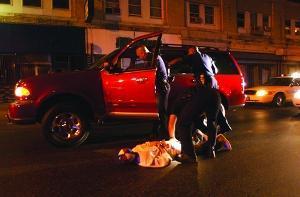
Oregon sheriffs and police chiefs jointly call for defelonizing simple drug possession. (Creative Commons)
NORML Releases Updated and Revised 2016 Congressional Scorecard. To mark national Voter Registration Day, NORML has released its updated and revised guide to members of Congress. The guide gives letter grades to our representatives based on the comments and voting records. Only 22 of the 535 senators and congressmen got "A" grades, while 32 members got an "F" grade.
Massachusetts Legalizers Cry Foul Over State-Issued Voter Guide. Campaigners behind the Question 4 legalization initiative say a state-issued guide sent to voters across the state inaccurately describes the fiscal consequences of the measure. The guide says they are "difficult to project due to lack of reliable data" and cites a report from a committee headed by a top opponent of legalization to the effect that taxes and fee revenues from legal marijuana sales "may fall short of even covering the full public and social costs. The Yes on 4 campaign points out that there is "reliable data" from legal marijuana states and that those states have easily covered administrative and other expenses.
Heroin and Prescription Opioids
Study: Number of Babies Born Suffering Withdrawal Symptoms More Than Doubles in Four Years. Researchers studying neonatal abstinence syndrome, which results from withdrawal from opioids to which fetuses were exposed in utero, report that the incidence of the syndrome has jumped from 2.8 cases per thousand live births in 2009 to 7.3 cases in 2013. At least some of the surge may be a result of drug policies aimed at cracking down on prescription drug use. "The drug policies of the early 2000s were effective in reducing supply -- we have seen a decrease in methamphetamine abuse and there have been reductions in some aspects of prescription drug abuse," said lead study author Dr. Joshua Brown. "However, the indirect results, mainly the increase in heroin abuse, were likely not anticipated and we are just starting to see these." The researchers also noted wide variations by state, from 0.7 cases per thousand in Hawaii to 33.4 cases in West Virginia.
New Psychoactive Substances
Bill to Criminalize More New Synthetics Passes House. A bill sponsored by Rep. Charlie Dent (R-TX) to add several new synthetic cannabinoids and opioids to the Controlled Substances Act passed the House Monday. The measure, HR 3537, now goes to the Senate.
Law Enforcement
Oregon Law Enforcement Calls for Defelonizing Drug Possession. The Oregon Association of Police Chiefs and the Oregon State Sheriff's Association have jointly called for people caught with "user amounts" of illegal drugs to face misdemeanor charges -- not felonies -- and be sent to treatment. Elected officials and prosecutors should "craft a more thoughtful approach to drug possession when it is the only crime committed," the top cops said, because felony charges "include unintended and collateral consequences including barriers to housing and employment and a disparate impact on minority communities."
South Carolina County Ponders Mandatory Jail Time for People Who Overdose. The chairman of the county council in Horry County, where Myrtle Beach is located, has inquired during a council meeting about whether to make people who suffer opioid overdoses spend three days in jail. Chairman Mark Lazarus would also like to see mandatory drug treatment required. He added that jailing people who overdose wouldn't discourage them from getting medical help because they're usually unconscious and someone else calls for emergency assistance.
back to top
The polls are looking good in Florida and Massachusetts, California's governor signs a mandatory prescription monitoring bill, Iran executes more drug offenders, and more.
Marijuana PolicyCalifornia Nurses Endorse Legalization Initiative. The California Nurses Association has formally endorsed the Prop 64 legalization initiative. "California Nurses believe strongly that the prohibition and criminalization of marijuana has ruined generations of lives, wasted hundreds of millions of taxpayer of dollars and failed to protect the public health and safety, "Deborah Burger, the organization's president said in a prepared statement Tuesday. "On balance, Proposition 64 is significantly better for public health and safety than the broken status quo, and we are pleased to endorse it,"she added. The California Medical Association has also endorsed Prop 64; the California Hospitals Association opposes it.
Massachusetts Legalization Initiative Favored in New Poll. A new WBZ-TV/UMass Amherst poll has the Question 4 legalization initiative favored by 53% of respondents, with 40% opposed and 7% undecided. Of demographic groups, only voters over 55 and self-described conservatives opposed the measure.
Medical Marijuana
Florida Medical Marijuana Initiative Cruising to Victory in New Poll. A Florida Chamber of Commerce poll has 73% of voters favoring the Amendment 2 medical marijuana initiative, with only 22% opposed. Because it is a constitutional amendment, the initiative needs 60% to pass, but it is polling well beyond that.
Heroin and Prescription Opioids
California Governor Signs Prescription Monitoring Bill into Law. Gov. Jerry Brown (D) Tuesday signed into law Senate Bill 482, aimed at preventing "doctor shopping." The new law requires doctors to check a database of prescription drug prescriptions before writing prescriptions for potentially addictive drugs. The state already has an electronic prescription database, but until now it's use has been optional. The new law will go into effect in six months.
International
Iran Hangs Five More Drug Offenders. Iranian authorities executed four drug prisoners at Tabriz Central Prison on Saturday and one more at Taybad Prison on Sunday. Their names were Abdolkarim Bapiri, Mehdi Molaie, Salah Ghaderian, Ali Mohtabipour, and Hadi Oskouie. In recent years, Iran has executed hundreds of drug offenders each year.
back to top


